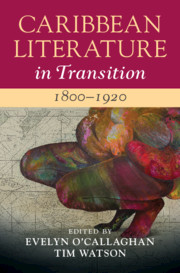Book contents
- Caribbean Literature in Transition, 1800–1920
- Caribbean Literature in Transition
- Caribbean Literature in Transition, 1800–1920
- Copyright page
- Contents
- List of Illustrations
- Contributors
- Acknowledgements
- Introduction
- Part I Literary and Generic Transitions
- Part II Cultural and Political Transitions
- Chapter 8 John Jacob Thomas and the Grammar of Freedom
- Chapter 9 How Barbados Transformed Radical British Author Eliza Fenwick into a Reactionary
- Chapter 10 Mary Seacole’s Travels and Tales
- Chapter 11 Genealogy and Nonhistory in Adolphus, A Tale
- Chapter 12 Obeah, Religion, and Nineteenth-Century Literature of the Anglophone Caribbean
- Part III The Caribbean Region in Transition
- Part IV Critical Transitions
- Bibliography
- Index
Chapter 12 - Obeah, Religion, and Nineteenth-Century Literature of the Anglophone Caribbean
from Part II - Cultural and Political Transitions
Published online by Cambridge University Press: 16 December 2020
- Caribbean Literature in Transition, 1800–1920
- Caribbean Literature in Transition
- Caribbean Literature in Transition, 1800–1920
- Copyright page
- Contents
- List of Illustrations
- Contributors
- Acknowledgements
- Introduction
- Part I Literary and Generic Transitions
- Part II Cultural and Political Transitions
- Chapter 8 John Jacob Thomas and the Grammar of Freedom
- Chapter 9 How Barbados Transformed Radical British Author Eliza Fenwick into a Reactionary
- Chapter 10 Mary Seacole’s Travels and Tales
- Chapter 11 Genealogy and Nonhistory in Adolphus, A Tale
- Chapter 12 Obeah, Religion, and Nineteenth-Century Literature of the Anglophone Caribbean
- Part III The Caribbean Region in Transition
- Part IV Critical Transitions
- Bibliography
- Index
Summary
This essay focuses on selected works of fictional prose, published between the close of the eighteenth century and the opening of the twentieth, that explicitly treat Obeah in their elucidations of Caribbean life and expressions of anxiety ushered in by the Haitian Revolution and pending abolition of plantation slavery. ‘Obeah’, the term used for African-Caribbean ‘slave magic', is developed in these works as a literary and cultural signifier of tensions between waning European imperial power and African rebellion, between ‘black Obi’ and ‘white sugar'. This essay explores fictional representations of Obeah in and around the nineteenth century, from William Earle's Obi (1800) to Herbert de Lisser's The White Witch of Rosehall (1929), that reveal the development of Obeah during this time as a distinctly Caribbean counterculture that challenged the supposedly supreme authority of plantocratic power and become a metonym for black political agency within and beyond the discourse that would deny it those claims.
Keywords
- Type
- Chapter
- Information
- Caribbean Literature in Transition, 1800–1920 , pp. 198 - 212Publisher: Cambridge University PressPrint publication year: 2021

